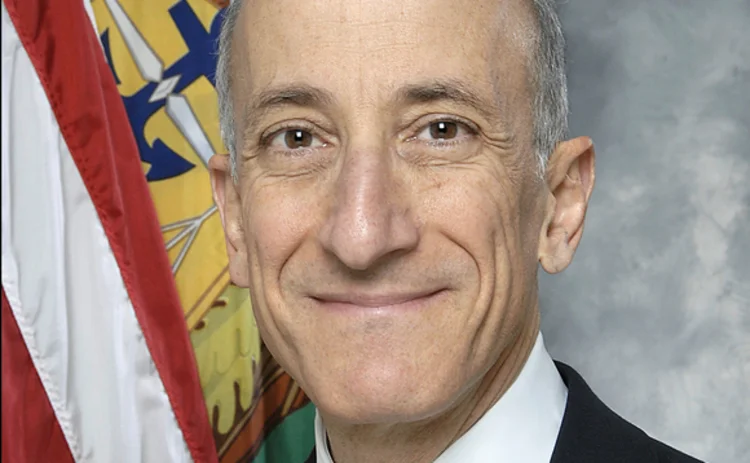
Massad says CFTC is willing to hear energy firms’ concerns
In an exclusive interview at Energy Risk Summit USA in May, CFTC chairman Timothy Massad chose to highlight the agency’s willingness to hear industry arguments on issues such as trade reporting, position limits and record-keeping

The arrival of chairman Timothy Massad at the US Commodity Futures Trading Commission (CFTC) last year didn't just bring a fresh face to the agency, but a change of tone as well.
Lawyers and energy firms say Massad's more industry-friendly stance compares favourably with that of his predecessor, Gary Gensler, who lobbied hard for the CFTC to win extra powers under the 2010 US Dodd-Frank Act, including the authority to regulate over-the-counter derivatives. In the years that followed, the Gensler-era CFTC embarked on a frenetic campaign of rule-making, which in some places threw up unintended consequences that Massad is now trying to resolve.
In a speech to Energy Risk Summit USA on May 12, Massad laid out some of the areas the CFTC was working on, particularly in relation to end-users of commodity derivatives. Under Dodd-Frank, all OTC derivatives trades are required to be reported to entities known as swap data repositories (SDRs) in close to real-time, while many transactions must also be centrally cleared. That has created problems for some end-users, such as Texas-based Southwest Airlines, which had complained its anonymity was being compromised due to the need to report its activity in less liquid, longer-dated markets. In response, the CFTC issued a no-action letter last November allowing the airline and its dealers a delay in reporting their trades, Massad told delegates at the conference in Houston.
Other fixes included an effort to clarify the ambiguous regulatory treatment of contracts with embedded volumetric optionality under Dodd-Frank - for example, physical natural gas supply deals that allow buyers to purchase additional volumes during cold weather. The CFTC released a final interpretation seeking to clarify the ambiguity on May 12, the day of Massad's speech. In other recent moves, the agency loosened reporting requirements on commodity trade options and proposed amendments to reduce onerous end-user record-keeping requirements under CFTC rule 1.35, which specifies what sort of trading records market participants must retain.
Dodd-Frank's toughest regulatory requirements are reserved for swap dealers, which must register with the Chicago-based National Futures Association (NFA) and submit to harsher rules in areas such as capital, margin and business conduct. Currently, firms that trade more than a de minimis amount of $8 billion in OTC derivatives notional per year are required to register, but this threshold is set to automatically drop to $3 billion in December 2017. The CFTC's own rule laying out the definition of a swap dealer requires the agency to complete a study on the impact of the move no later than 30 months after companies began reporting to SDRs - a deadline the CFTC now expects to miss. Nonetheless, in his speech to Energy Risk Summit USA, Massad said the agency had started work on a "comprehensive report to analyse the issue".
[The CFTC's implementation of Dodd-Frank] was what it was. Congress mandated it had to be done in a year
Perhaps one of the biggest items in Massad's inbox is the CFTC's controversial plan to clamp down on what it sees as "excessive speculation" in commodity derivatives with a federal position limits regime. The agency's latest proposal, from November 2013, imposes both spot and non-spot month limits on 28 energy, metals and agricultural futures contracts, as well as economically equivalent OTC deals. It followed an earlier rule that was vacated by a federal judge in September 2012, after a court challenge by industry groups.
In the interview below, Massad suggests the CFTC wants to work more constructively with the industry this time around. The agency would take recent comments by market participants on position limits "very seriously", he says. Significantly, he adds that it would consider the idea of giving exchanges responsibility for handing out non-enumerated exemptions for end-users trying to hedge their exposures.
In your speech earlier, you mentioned that your father worked in the oil industry when you were a child and that your family spent time living in Texas and Louisiana as a result. Has that given you a different perspective on the energy market?
Timothy Massad: Everyone's background shapes their attitudes in life. I was very fortunate as a kid; we moved around a lot, which I think was of benefit in terms of just having to deal with different kinds of people. That served me well. My father was in the oil industry. I've got a brother-in-law and a nephew who are also in the oil industry - so yes, I learned a little bit about the oil industry. It's an incredibly important, incredibly challenging industry to work in. What's happened in terms of progress on drilling techniques is really astounding, and really is a revolution. So I suppose I hear about that more than many people might because I have relatives in the industry. I probably know a little bit more about it than the average person.
Since you became chairman of the CFTC, you've talked about the need to makesome tweaks to Dodd-Frank rules. You mentioned those in your speech earlier - can you give us a flavour of what those are?
TM: Well, I outlined a number of things that we've done, to specifically address end-user concerns. Those pertain to reporting requirements and making sure the new swap rules don't create inappropriate burdens. There were things like clarifying the rules around embedded volumetric optionality, which we just did; on trade options; the reporting requirements in rule 1.35; balancing reporting with hedging needs; and delaying reporting in illiquid markets.
We're looking at the swap trading rules and the rules on swap execution facilities (Sefs), making a lot of changes there in terms of operational changes, error trade policies, confirmation policies, clarifying and reducing reporting obligations, or making sure there's sufficient flexibility on execution methods. We're probably going to take a look at the made-available-to-trade determination process to see if that's working well. So there's a host of things there, and there are others.
On the delayed reporting issue, the only instance we've seen is the no-action letter you issued to Southwest Airlines last November. Is that something that you're implementing more broadly for companies in a similar position?
TM: No. The basis for concluding that you needed to make an adjustment was that you had a very illiquid market. An illiquid market, by definition, means there aren't many participants. I find it funny when people say: "Well, why don't you make this available to more people?" If there were lots of people in that market, we wouldn't have needed to do this.
If there are other situations that are similar in other markets that arise, we'll take a look. But I think this just shows that we're willing to make sure that reporting requirements don't undermine companies' ability to hedge in markets that are truly extremely illiquid.
Congress requested that the CFTC implement Dodd-Frank quickly. The CFTC did move rapidly in terms of implementing the rules, and you're now having to go back to look at tweaks, as we've just discussed. Do you think that perhaps the initial rule-making process was a bit too rushed?
TM: It was what it was. Congress mandated it had to be done in a year. I don't really spend a whole lot of time thinking about how might things have been done differently three or four years ago; I'm really focused on what we need to do now.
Position limits are a particularly heated topic. Lots of people have offered opinions and concerns about how the CFTC's proposed limits should operate. How do you plan on responding to the weight of concern around that issue?
TM: Well, we've gotten a lot of comments. We're taking them very seriously. There are a lot of aspects to the rule, and in all those areas - whether it's the definition of bona fide hedging, whether it's how the non-enumerated hedge process should work, whether it's how you set deliverable supply estimates and how you set the limits, whether it's aggregation issues - we're going to look at the comments and come up with the best overall policy that we can, consistent with what Congress has directed.
Do you think trade options should be included in position limits?
TM: That's something we'll look at. I think we noted that when we took action a couple of weeks ago with respect to trade options there was a legitimate question of whether they should be subject to position limits. I know there are a lot of people who feel they shouldn't be.
You mentioned in your speech earlier that you were open to the idea of working with exchanges on the non-enumerated hedge exemptions. Could you expand on how that might work?
TM: We're willing to look at that possibility. A number of commenters have suggested that, but we'd have to look at how the process would work. How would there be sufficient oversight in standards, so that we can feel that the process is working fairly and consistently with the goals we have for the regulation? We want this process to be efficient, and that might be a way to make sure it's an efficient process. But again, we've got to make sure that those decisions are going to be made properly, and that there's a strong oversight.
Is part of your thinking driven by the problem of bandwidth and the commission's ability to deal with all the likely exemption requests?
TM: Well, I guess it's a question of what are the tasks that we can do most efficiently, and what are the tasks that maybe the exchanges could do, as long as it's subject to our oversight. Certainly, our resources are a factor in looking at that, but again, I'm simply saying we're willing to consider it. I don't yet know where the other commissioners are on that, but it's something that we'll at least look at.
In October 2012, energy market participants collectively moved away from using OTC swaps and towards futures block trades. Was that move - also known as ‘futurisation' - a positive or a negative thing for transparency?
TM: Well, our job is to create a framework that achieves the basic statutory goals of transparency: of making sure these markets operate with integrity; of preventing fraud and manipulation. It's not up to us to decide whether products should be traded as futures or as swaps. That's really up to the marketplace.
Do you think that more trading volumes should be pushed into the open by raising the block size thresholds at exchanges?
TM: Well, the block size issue is one that we will get to in connection with DCM [Designated Contract Market] Core Principle 9. Our goals there are: really, is there transparency? It's not so much dictating a particular way in which things are trading, but we want to make sure that the block rules aren't being used to evade requirements for transparency and other benefits that trading on-exchange or on-Sef can bring.
In your speech, you said there was a need for data-driven analysis and a full report on the impact of moving the swap dealer de minimis threshold. Would you advocate a similar approach in the case of changing the block size thresholds?
TM: Well, we're always interested in looking at data on what's happening in the market and what the potential impacts of rules are. So if people have data that they want to share with us, we're always open to that.
Out of about 100 firms that have provisionally registered as swap dealers with the NFA, there are a very small number of actual energy companies. Is that a source of concern to you, and do you think more should have provisionally registered?
TM: I don't have a view on that. The threshold was set, frankly, at a time when there was really very limited information about the market. As I say, we're going to do some work on looking at the implications of the threshold moving down, and we'll invite public comment on that.
Going back to the report on lowering the swap dealer de minimis threshold, could you tell us what issues you're planning on looking at in that report?
TM: I think we'll look at what the implications are of the threshold falling to $3 billion in terms of liquidity, in terms of the regulatory goals of swap dealer registration, in terms of its impact on firms, and we'll try to look at that in different areas of the market. It may not be the same for all products.
In the CFTC's rule defining a swap dealer, the deadline for this study was set to 30 months after the start of SDR reporting - which will be July 2015. Are you going to miss that deadline?
TM: We're going to try to do a really good study, and again, provide the public with an opportunity to comment on that, because I think that's the best way to put the commission in a position to have data analysis that it can use to decide what action to take.
In November last year, you supported the idea of making a tweak to the agency's rules to ease the record-keeping burden of rule 1.35 for end-users. Some firms have complained that doesn't go far enough. Could you give us an idea of how you feel about that issue?
TM: Well, we do have the proposed rule out there. We've gotten some public comment on that. We're thinking about that, and I expect we'll finalise something in the near future. It's a balance between wanting to make sure we have the ability to get information where we need to, to make sure the markets are operating with integrity, versus not wanting to impose excessive costs on people. So we're looking at that issue. We proposed some changes that would lessen the reporting burden. There are those who think we should go further, and there are those who think we've gone too far. So we'll have to balance that.
Many commenters in that rule-making expressed the view that rule 1.35 should be limited to firms that have a fiduciary duty to their customers, such as futures commission merchants and floor brokers. Do you have an opinion on that?
TM: I know that that's a position that many have taken, but I haven't made my mind up on that yet.
During the 2008 financial crisis, regulators were very concerned they didn't have enough data about the global swaps market. Are you now in a position where you've got so much data coming in that you're struggling to use it?
TM: Well, the whole data collection effort is like a big infrastructure project. It takes time to build this out, and people have to recognise that. You can't expect to go from a situation where you have essentially no data on a market that is measured in the $600 trillion notional amount range, which is global and has thousands and thousands of participants, to a situation where you know exactly what's going on, you're getting all this data being reported by those thousands of participants, and it all comes in perfectly, makes sense, and is easily manipulated and so forth. It just takes time to get there.
We've made, though, tremendous strides. I can get reports on who's got the biggest exposures in the market - I can break that down by asset type, cleared and uncleared. We can monitor positions much more easily, but there's still a lot we need to do. Part of that is trying to standardise and harmonise reporting rules, so that information comes in a consistent manner to the various trade repositories, or can be assembled in a consistent manner. Part of that is getting the firms that have the obligations to report to take those obligations seriously, and give us good data to begin with. Part of it is looking at where we can improve our rules to clarify obligations so that we get to that result. It's also a resource challenge, but we've been building up to meet that. So I think we're making good progress. There's still a lot of work to do.
When you say you're making sure that more participants take their obligation to report data seriously, does that mean clamping down on violations?
TM: Certainly, if we see them, we will, and we've done that in a few cases.
US commodity markets have tremendously deep liquidity and play a key role in global price formation. Given regulatory changes and diminishing liquidity, some participants are worried they may not play such a pivotal role in future. Does that concern you as well?
TM: We certainly don't want to diminish liquidity, but I think we've made a societal judgement that we also need to regulate this market, because of the potential for excessive risks that we saw in 2008. By its nature, that does impose some costs on doing business, but our goal is to try to implement that framework in a way that still maintains these markets as strong, liquid, dynamic and innovative; to do it in a way where we can harmonise as much as possible with other jurisdictions, who are committed to doing the very same things we're doing, so that we get to a place where we have a global framework.
On the question of harmonisation, you have previously given the impression that you think achieving consistency across jurisdictions is quite a difficult goal. Do you still believe that?
TM: I said identical regulations are hard, but that doesn't mean we can't have reasonably similar rules. Look at any area of financial regulation and show me an area where consistency exists, across national boundaries. There isn't one. There may be a greater expectation for consistency with swaps, because people are coming at this from the standpoint that this market became global before it became regulated. That's highly unusual.
Look at what happened with the securities market coming out of the Great Depression. We created a regulatory framework, which has served us quite well.
The basic principles of it have remained unchanged. It then became a global market. But there are significant differences in how you sell securities throughout the world. If I do a public offering in this country, that doesn't mean I'm entitled to do a public offering anywhere else. The same goes with a bank loan, mergers and acquisitions, and many other areas - laws vary by nation.
We're a world that's still a collection of nation states, which each pass laws and regulations. Truthfully, we've made tremendous progress in swaps in terms of trying to agree on the basic principles of how we're going to go about regulating this market. We're constantly working with one another as we develop rules. If you compare it to any other area of financial regulation, I think we're making enormous strides to get this pretty equal. But if you compare it to what existed before 2008, well, yes, you're going to feel that there are some differences.
Correction, June 5, 2015: The article has been amended to state that the NFA is based in Chicago, not in Washington, DC, as originally stated.
Only users who have a paid subscription or are part of a corporate subscription are able to print or copy content.
To access these options, along with all other subscription benefits, please contact info@risk.net or view our subscription options here: http://subscriptions.risk.net/subscribe
You are currently unable to print this content. Please contact info@risk.net to find out more.
You are currently unable to copy this content. Please contact info@risk.net to find out more.
Copyright Infopro Digital Limited. All rights reserved.
You may share this content using our article tools. Printing this content is for the sole use of the Authorised User (named subscriber), as outlined in our terms and conditions - https://www.infopro-insight.com/terms-conditions/insight-subscriptions/
If you would like to purchase additional rights please email info@risk.net
Copyright Infopro Digital Limited. All rights reserved.
You may share this content using our article tools. Copying this content is for the sole use of the Authorised User (named subscriber), as outlined in our terms and conditions - https://www.infopro-insight.com/terms-conditions/insight-subscriptions/
If you would like to purchase additional rights please email info@risk.net
More on Commodities
Energy Risk 2024 Software Rankings: IT demands increase amid rising risk
Heightened geopolitical and credit risk increase requirements on commodities software
Energy Risk Asia Awards 2023: the winners
Winning firms demonstrate resiliency and robust risk management amid testing times
ION Commodities: addressing the market’s recent pain points
Energy Risk Software Rankings winner’s interview: ION Commodities
Energy Risk Commodity Rankings 2023: adapting to new market dynamics
Winners of the 2023 Commodity Rankings provided reliability when clients faced extreme change
Energy Risk Software Rankings 2023: managing uncertainty
Unpredictable markets make CTRM software choices key
Navigating the volatility and complexity of commodity markets
Commodity markets have experienced significant challenges since the Covid-19 pandemic, the conflict in Ukraine and the subsequent sanctions imposed on Russia. These unprecedented events have caused fluctuations in supply and demand, disrupted global…
Energy Risk Asia Awards 2022
Recognising excellence in energy risk management
Market shrugs off EC’s plan to change gas benchmark
Dutch TTF prices unmoved, as market participants say they are “not taking it seriously”
Most read
- Top 10 operational risks for 2024
- Top 10 op risks: third parties stoke cyber risk
- Japanese megabanks shun internal models as FRTB bites







